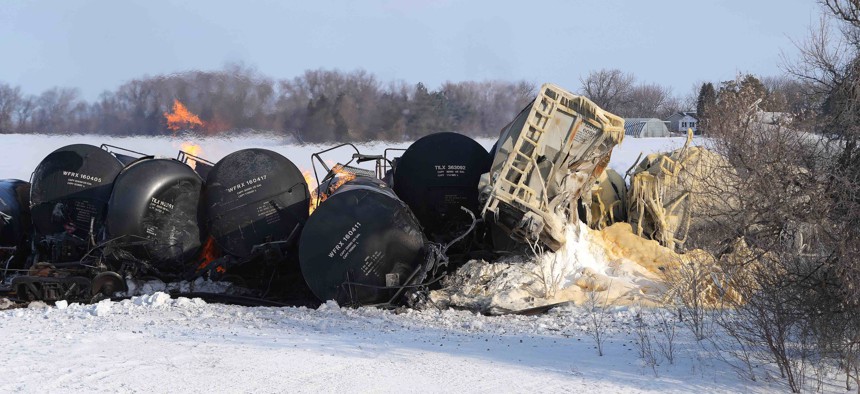Biden administration asks railroads for more details on hazardous cargo

A BNSF train carrying ethanol and corn syrup derailed and caught fire in the west-central Minnesota town of Raymond, forcing residents near the scene to evacuate in the middle of the night. David Joles/Star Tribune via Getty Images
A proposed rule is designed to help local emergency responders have better information when they arrive at the scene of a derailment.
Local emergency responders would get quicker access to information about freight trains that derail under a new Biden administration proposal that comes in response to the spill of toxic chemicals in East Palestine, Ohio, this February.
The proposed rule from the Pipeline and Hazardous Materials Safety Administration (PHMSA) would require railroads to keep up-to-date electronic information about hazardous materials being shipped on a train that could be accessed by emergency responders. In the event of a derailment, the railroad would have to “push” that information to local agencies to help with their response.
“When railroads transport hazardous materials, they must do so safely and responsibly,” said U.S. Transportation Secretary Pete Buttigieg in a statement. “Our proposal would improve rail safety and help protect communities across the country by requiring railroads to maintain detailed, real-time information about trains carrying hazardous materials.”
The rule “will enable first responders to better prepare for the risks present at the scene of an incident BEFORE they arrive on scene,” added PHMSA Deputy Administrator Tristan Brown. “This will improve safety for firefighters and first responders, and the communities they so courageously serve.”
The move comes as the National Transportation Safety Board convenes hearings in East Palestine this week to investigate the causes and response to the February derailment of a Norfolk Southern train. Several cars that came off the tracks there began leaking vinyl chloride, which ignited and forced thousands of local residents to evacuate the area.
Local officials, particularly from fire departments, have long sought easier ways to get a hold of information about hazardous shipments.
“Firefighters are often first to show up at many emergencies, including train derailments and HazMat incidents. Accurate, up-to-date information about train contents is critical to keep first responders and the communities they serve safe,” said Edward Kelly, the general president of the International Association of Fire Fighters. The union “strongly supports” the Biden administration proposal, he said.
A spokesperson for the Association of American Railroads said the industry group is still reviewing the administration proposal.
“Railroads are committed to ensuring every first responder who arrives at the scene of a rail emergency has the right information to respond safely,” said Ted Greener, the spokesperson. The industry developed an app, called AskRail, that gives trained local responders at a crash site the ability to see what chemicals are on train cars and how to handle them in emergencies, he noted.
The group also has worked to make the information available to emergency dispatchers, as well as on-the-ground personnel, which could help in situations where responders have poor cellphone reception.
“The industry looks forward to working with PHMSA to ensure the security of sensitive information and advance first responder access to timely, accurate information,” Greener said.
In February, the Transportation Department indicated it would move to make information about harmful substances on board trains easier to access. It asked the industry to “provide proactive advance notification to state emergency response teams when they are transporting hazardous gas tank cars through their states instead of expecting first responders to look up this information after an incident occurs.”
“USDOT is also pursuing further requirements in this area,” it said then, “but railroads should not wait.”
PHMSA will provide details about the new rule and accept comments from the public once the rule is published in the Federal Register.
Daniel C. Vock is a senior reporter for Route Fifty based in Washington, D.C.
NEXT STORY: Preparing for a Future of Supercharged Storms






